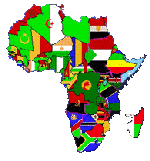Research may not seem so interesting to some, but it’s really fascinating, especially people group research. I work with a team that gathers the information about people groups all over Sub-Saharan Africa. We’re really pretty specific about what we’re looking for – do these people have access to the Gospel or not. Or even better, is anyone implementing church planting strategies among this people group. Yes, worldview studies can be helpful in planning strategies, knowing more about culture is helpful, but in the initial stages what is most important is whether or not the peoples of Sub-Saharan Africa (and the rest of the world) have had an opportunity to hear and understand the Gospel in their heart language.
Sometimes we find that workers who have been assigned to various parts of a country start a church in the middle of people group “A” but they are using the national language or language “B”, their heart language, from another part of the country. The question is, Does people group “A” have the opportunity to hear and understand the most important message of all time in their language? I don’t think so.
In one country we found that one of the largest people groups is close to 10% evangelical, but in many parts of that country there are still others that have never heard the Gospel in their language. My initial thought was that the people with the Gospel need to take it to the others – until I learned that those with the Gospel also held the others as slaves. The former slave-owners might not be the best messengers in this situation.
Research isn’t easy because as others have said, one reason the lost are lost is because they’re hard to get to. It sometimes takes days of driving on very bad roads, sleeping in less than luxurious accommodations, asking lots of questions and getting lots of not-so-useful information. But, it’s worth it when we can confirm that among this people group there are churches and they are reaching out to those around them. Or we find a people group that has no church planting strategies, but they are open to the Gospel. You see, research can also be used as a filter – how are we received when we arrive in their town or village, do they seem open to evangelicals, etc.
Research is important as we think about deployment. How do we determine where to place personnel? Wouldn’t it be among the lost? I once met a couple who said when they were trying to decide where to serve, they asked, “Who are the least reached?” And when they got the answer, that’s where they went. It’s like I heard over and over again when I was in seminary (a long time ago) – Why should so many people have the privilege of hearing the Gospel over and over again when so much of the world still hasn’t heard it once? Let’s take the Gospel to those who haven’t heard – and let research show us where those people are.
Revelation 7
9After this I looked and there before me was a great multitude that no one could count, from every nation, tribe, people and language, standing before the throne and in front of the Lamb. They were wearing white robes and were holding palm branches in their hands. 10And they cried out in a loud voice:
"Salvation belongs to our God,
who sits on the throne,
and to the Lamb."
In my opinion, research helps us get to Revelation 7!!
For the Kingdom,
Lucy D
Lucy is the Research Strategy Associate for the Sub-Saharan African Peoples Affinity Group (IMB, SBC). She and her husband have served in Africa for almost 24 years. In this position, she helps coordinate research information and helps people group teams and leadership interpret the research data so that they can make informed decisions about strategy.


AMEN, LD!!!!
ReplyDelete